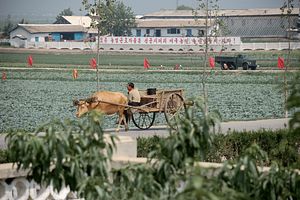While some Pyongyangites started off the week by checking out plasma-screen TV’s at a consumer goods fair, Daily NK published an ominous story that reminds the reader of the dark 1990s:
An increasing number of North Koreans are suffering from the effects of food insecurity and malnutrition, according to inside sources who spoke with Daily NK. A rumor is circulating in Ryanggang and North Hamgyong provinces that the body of someone who starved to death has been seen near the train station in Hyesan City.“More than a handful of people have come forward and said that they saw the body of someone who starved to death near the Hyesan train station. The food situation was relatively good for the past few years, so it’s such a shame that we’ve returned to dire circumstances so suddenly,” a source in Ryanggang Province told Daily NK.
For several years, the supply of food in North Korea has looked remarkably stable compared to the 1990s. A combination of more freedom for the markets to operate; more leeway for farmers in how they operate, produce, and sell their goods (and procure inputs such as fertilizer); and larger and more consistent imports from China – these are all factors that have led to better food security overall in North Korea. Market prices have sent a clear message on this.
But perhaps “stable” was the wrong way to describe the food supply. “Consistent” may have been a better way of looking at it. A system is hardly stable when a combination of relatively usual events for the country – bad weather and changing geopolitical conditions – can shake its core.
As usual with these dynamics, it would be wrong to attribute the changes to one single factor. That is, we cannot say that sanctions led to starvation in some automatic fashion. Rather, several trends have coincided and caused the current dire situation.
First, North Korea has experienced a very troubling drought early on in the farming season. As Andy Dinville shows at 38 North, using satellite data, weather conditions have been particularly bad this year, significantly harming this year’s harvest. Daily NK’s source also noted the impact of the drought: “There was a severe drought at the beginning of the year in North and South Hamgyong provinces and Ryanggang Province. The corn and rice harvest did not meet its targets, amounting to approximately half the volume produced last year.”
In any normal year since the early 2000s, when market mechanisms seriously became a routinized part of North Korea’s agricultural economic system, the effects of a drought could have been offset at least in part by increased imports from China, or other sorts of shifts.
Which brings us to a second factor for potential food shortages, namely sanctions and the current tensions and China’s enforcement of economic pressure on North Korea. This mean that overall trading conditions are difficult, and Chinese sellers are wary of trusting that they’ll actually receive payments from North Korean buyers. It also means that goods such as fertilizer for farming are more difficult to acquire. As the Daily NK article notes, citing a North Korean source:
“Last year, North and South Hamgyong and Ryanggang provinces endured a flood of epic proportions and this year there was a drought, so the agricultural situation in both regions is poor. Additionally, because of the sanctions, it has been harder to procure different kinds of fertilizer necessary for farming, so this has exacerbated the damage,” he continued.
Benjamin Katzeff Silberstein is the co-editor of North Korean Economy Watch and an associate scholar with the Foreign Policy Research Institute.
This post was originally published by North Korean Economy Watch and appears with kind permission.

































